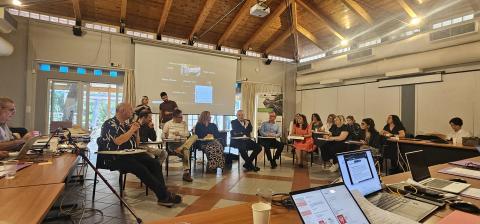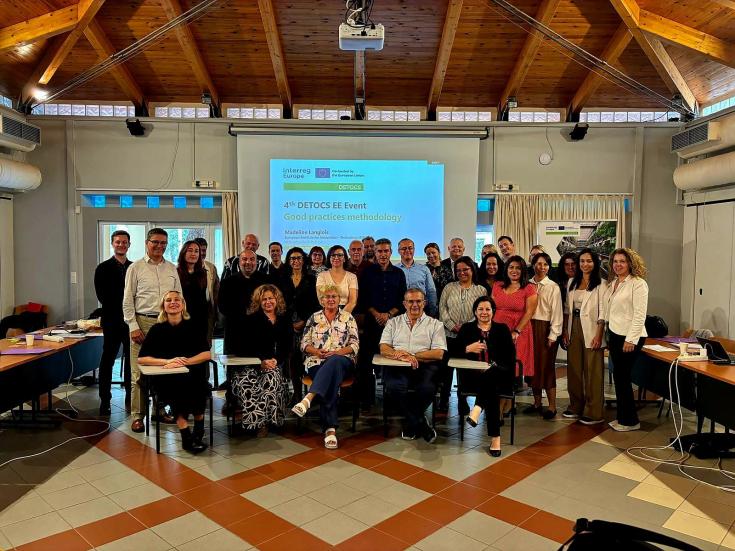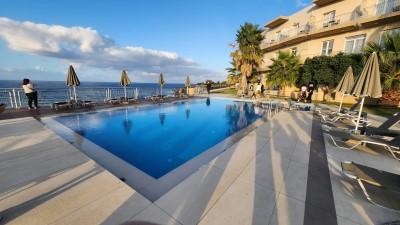4th Interregional Exchange of Experience Event in Crete
On 23-24 October 2024, the 4th Interregional Exchange of Experience Event & Steering Group Meeting of the Interreg Europe DETOCS project took place at the Mediterranean Agronomic Institute of Chania (MAICh) in Crete, Greece. The event gathered participants from across Europe to discuss best practices, share regional achievements, and outline collaborative actions aimed at decarbonising the tourism industry post-COVID-19.
A Forum for Exchange & Inspiration
The Exchange of Experience Event opened with warm welcome by the hosting institute, MAICh, alongside representatives from the Region of Crete. This was followed by an overview of the project’s progress and the objectives of the event. The day's main focus was a dynamic exchange of experiences among partners from Local Energy Agency Spodnje Podravje (LEASP).
One of the highlights of the day was the series of success stories shared by various regions. The Region of Crete, the University of Malta, and Thermopolis presented examples of decarbonisation strategies applied in tourism. From these presentations, participants gained insight into effective policy improvements and strategies that could potentially be replicated across different contexts.

Good Practices Open Forum
Following a networking coffee break, the day continued with an open forum and moderated panel discussion. This session enabled the participants to explore a wide range of good practices through detailed case studies from several regions:
- LEASP from Slovenia introduced their "One-Stop Shop" initiative, which aims to provide 1,400 consulting services by the end of the year, supporting energy transition through regional contact points.
- The Municipality of Campobasso, Italy showcased their work in creating renewable energy communities, strengthening collaborations between public authorities and tourism enterprises.
- The Region of Crete presented their EcoHotel Project, demonstrating how a carbon footprint calculation tool is reducing energy consumption in hotels through targeted consulting services.
- The University of Malta & Malta’s Ministry for Tourism and Public Cleanliness highlighted energy audits for guesthouse owners, offering comprehensive cost-benefit analyses to uncover potential savings and funding opportunities.
- The Municipality of Middelburg in The Netherlands shared insights into virtual tourism initiatives aimed at enhancing accessibility and marketing effectiveness.
- Representatives from the Regional Energy Agency – Pazardjik & Municipality of Burgas in Bulgaria presented their energy community’s success in boosting investor confidence with the implementation of photovoltaic systems and solar charging stations for public transport.
- Partners from the South Ostrobothnia in Finland explained how their regional energy counselling programme brings advisors closer to target groups, offering guidance on electricity, heating, and energy-saving measures.
- CDDA from Hungary (Tamási) introduced the installation of a geothermal heating system, which utilises local thermal water whilst reducing natural gas usage by 70%, was presented as a potential DETOCS good practice
- Renewable Nagyatád (Waste Recovery) in Hungary was presented as geothermal energy is produced from waste heat, which is then utilised for heating, effectively replacing natural gas consumption in two spas and four public institutions.
The forum concluded with a summary of key takeaways and strategies to be incorporated into each region’s approach to sustainable tourism.
The first day came to a close with guided study visits, followed by a networking dinner in Chania's Old City Centre.
Steering Group Meeting & Study Visit
The second day of the event began with a study visit to a unique local resort, offering participants a chance to observe first-hand the sustainable practices being implemented in Crete’s tourism sector.
Following the study visit, the Municipality of Middelburg gave a presentation on the role of virtual tourism as an innovative tool to enhance both marketing reach and accessibility in the context of post-pandemic recovery. Next, the University of Malta presented a thematic report, which consolidated the project’s findings and set the stage for future collaborative efforts among the partners. This report offers a cohesive understanding of the various regional decarbonisation approaches.
The day continued with a steering group meeting, where LEASP updated participants on ongoing project activities and reporting requirements. A key moment in the meeting was MAICH’s proposal for a joint thematic guidebook, which will consolidate the key lessons and expectations from each partner region.
By bringing together regional representatives to share best practices, engage in open discussions, and plan future actions, the 4th Interregional Exchange of Experience Event & Steering Group Meeting reaffirmed the project’s commitment to fostering sustainable and decarbonised tourism across Europe.

